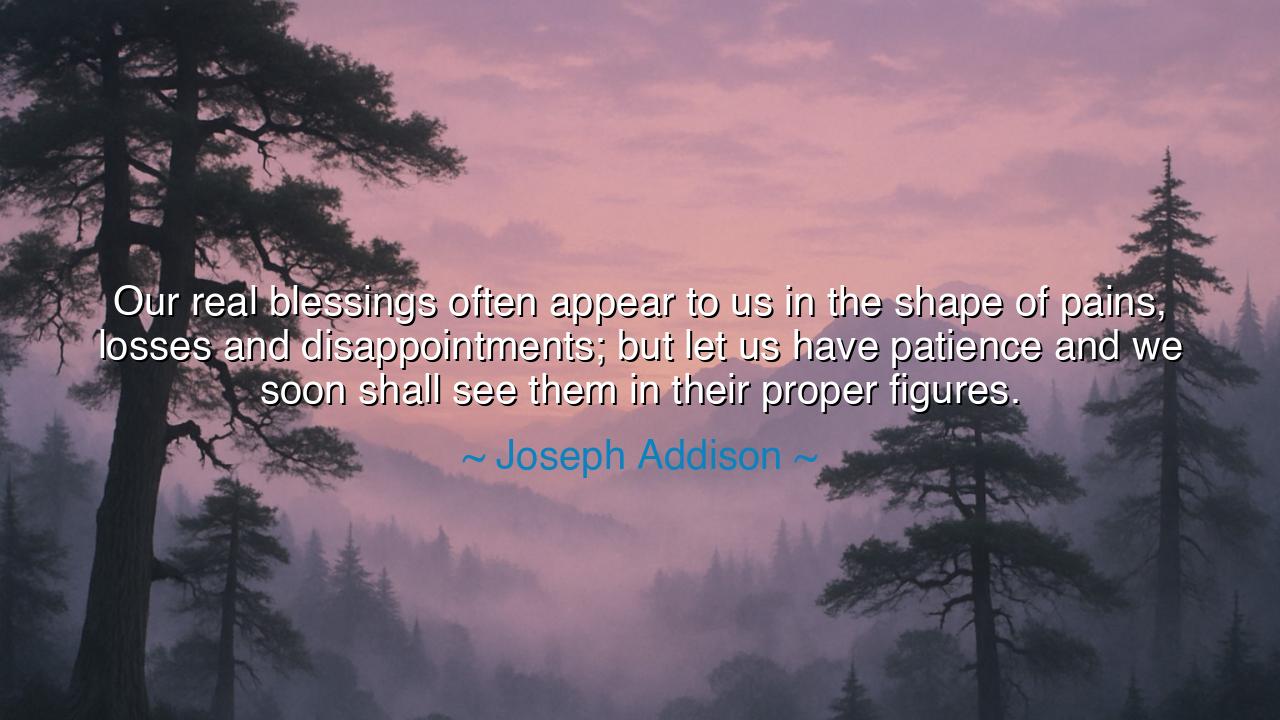
Our real blessings often appear to us in the shape of pains
Our real blessings often appear to us in the shape of pains, losses and disappointments; but let us have patience and we soon shall see them in their proper figures.






The words of Joseph Addison—“Our real blessings often appear to us in the shape of pains, losses and disappointments; but let us have patience and we soon shall see them in their proper figures”—carry the quiet thunder of truth spoken from deep reflection. For in the moment of suffering, when the heart feels crushed beneath the weight of failure or grief, we rarely see the hidden gift concealed within. Yet time, like a patient sculptor, reveals the form beneath the rough stone: what once seemed a curse often proves to be a blessing, disguised in sorrow’s cloak. Addison, a man of letters and moral wisdom, reminds us that only through patience does pain transform into wisdom, and loss into strength.
The origin of this teaching lies in Addison’s life and era. Living in the seventeenth and eighteenth centuries, he wrote not only essays and poetry but meditations on the human spirit. He had seen enough of the world to know that prosperity is fleeting, and that trials refine the soul far more than ease. He saw in the common struggles of mankind—illness, failure, rejection—not random cruelty, but hidden pathways to deeper growth. In his eyes, it was not the pleasant days that made men wise, but the losses and disappointments that forced them to look inward, to build patience, and to find a truer strength.
History provides many echoes of this truth. Consider Abraham Lincoln, who faced defeat after defeat in politics, endured personal tragedy, and lived much of his life in the shadow of melancholy. Yet it was these very trials that forged his character into one of endurance, compassion, and humility. Without such losses, he may never have carried the patience and wisdom needed to lead a divided nation through civil war. What seemed to be setbacks were, in truth, blessings in disguise, preparing him for greatness.
So too in the ancient world, the story of Joseph in Egypt teaches the same. Betrayed by his brothers, sold into slavery, cast into prison, he suffered loss upon loss. Yet every disappointment was a hidden thread leading him to his true destiny: to rise as a leader who would save nations from famine. In the moment, his sorrows seemed unbearable; but in time, they revealed themselves as the very instruments of blessing. Patience turned his misfortunes into triumphs, his pain into purpose.
Addison’s wisdom, then, is not mere comfort but a call to endurance. He teaches us that the soul must not judge too swiftly. The first appearance of hardship is deceptive; its true meaning is unveiled only in time. Patience is the key, for it allows the hidden blessing to ripen. Just as bitter seeds grow into nourishing fruit, so too do losses and disappointments grow into wisdom and strength, if only we allow time to reveal their true figure.
The lesson for us is clear: do not despise your trials. When pain strikes, when loss wounds, when disappointment shatters your hopes, resist the urge to declare your life cursed. Instead, be patient, and ask what hidden blessing may lie within. Life is not cruel without reason; often it is shaping you, refining you, preparing you for something greater than you can yet see. The eye of the present is blind, but the eye of patience sees far.
In practice, this means cultivating trust in times of hardship. Keep a journal of your struggles and return to it years later—you will often see that what you once lamented became a turning point for growth. When a door closes, seek what new path opens. When loss strikes, ask how it deepens your compassion. When disappointment comes, let it be the teacher of resilience. Patience is not mere waiting—it is the faith that time itself will unveil the truth.
So let Addison’s words echo across the ages: “Our real blessings often appear to us in the shape of pains, losses and disappointments; but let us have patience and we soon shall see them in their proper figures.” Let us walk through hardship not with despair but with quiet strength, knowing that what now feels like a wound may in time prove to be a crown. For the trials of today are often the treasures of tomorrow, hidden until patience reveals their true light.






AAdministratorAdministrator
Welcome, honored guests. Please leave a comment, we will respond soon